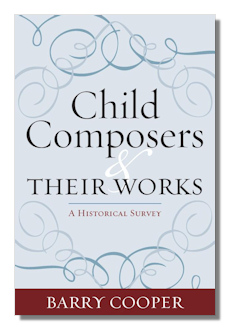
The Internet's Premier Classical Music Source
Related Links
-
Introduction
Acoustics
Ballet
Biographies
Chamber Music
Composers & Composition
Conducting
Criticism & Commentary
Discographies & CD Guides
Fiction
History
Humor
Illustrations & Photos
Instrumental
Lieder
Music Appreciation
Music Education
Music Industry
Music and the Mind
Opera
Orchestration
Reference Works
Scores
Thematic Indices
Theory & Analysis
Vocal Technique
Search Amazon
Recommended Links
Site News
 Book Review
Book Review
Child Composers & Their Works

A Historical Survey
Barry Cooper
Lanham, MD: Scarecrow Press. 2009. 216 pages.
ISBN-10: 081086911X
ISBN-13: 978-0180869110
Summary for the Busy Executive: An excellent start. However, it does make you hungry for more.
Sure, we've all heard of child composing prodigies, but how many of their works have you read about or even listened to? There are, of course, exceptions – notably Mozart and Mendelssohn – but even their childhood work suffers from neglect. I doubt we have ever heard even close to half of their early output (Mendelssohn had written about 150 scores before he reached 16. God knows how many Mozart composed).
Cooper makes a very convincing case for the study of this area, traditionally dismissed without so much as a look or a listen. Indeed, this book represents a kind of critical and scholarly manifesto. Cooper addresses mainly musicologists, but the general reader will likely find the polemics engaging.
He divides the book into two main parts: a broad outline of the field as well as a clearing away of the critical brush; a very brief survey of many individual composers. He compares this area of study to the milieu of the study of women's music years ago, when women were routinely dismissed without a hearing or ignored as freaks or as not worthy of the Great Masters. I think we can agree that one must listen to music before one condemns it, and that much of the perceived "freakishness" stemmed from a general misogyny or cluelessness about women. I still remember Aaron Copland wondering out loud about why there were no women composers comparable to men, even though he personally knew such women and beat the drum throughout his career for quite a few male minor composers. Furthermore, many composers haven't written at the level of the Great Masters, and yet we still enjoy listening to their music. I don't know of any composer who writes better than Bach, not even Mozart, Beethoven, Brahms, Wagner, Stravinsky, and Schoenberg. Do I give them up because they're not as good, or do I marvel at what they offer? At one point, Cooper lays bare the ironic twist that the same musicologists who berated the establishment for its treatment of women have committed the same sins in regard to children.
When we think of young composers (Cooper sets an age limit of 16 and a birth date before 1900, although he's not doctrinaire about either), most of us immediately think of Mozart, but there are scads more. Some – like Chopin, Mendelssohn, and Korngold – went from fine childhood works to fine adult ones. Others were somewhat middling (though, surprisingly, not incompetent) child composers who became greater as adults (Berlioz, Richard Strauss, Vaughan Williams, Bloch, Bartók, Martinů). Still others (Samuel Wesley, Frederick Ousely, William Crotch) burned like meteors as children, only to fall back to middling as adults. Some children died young (Arriaga, for example, around the age of 20), so we have nothing later. Many composers destroyed or held back their juvenilia (most moderns, unfortunately), and some came to composition late (eg, Stravinsky).
Cooper points out that studying even mediocre works by some children can yield some interesting results. Have they, for example, carried over composing "fingerprints" into adulthood? Have they rid them selves of certain musical habits they fell into as kids? "The child is father of the man," as Wordsworth wrote.
Unfortunately, Cooper doesn't answer these questions in any detail, but he doesn't mean to, either. He does just enough to whet your appetite, and he does provide information about recordings, where they exist. For example, all of Mozart's works are recorded in the Philips complete Mozart edition. So, scholars, get busy!
Copyright © 2010 by Steve Schwartz.


















